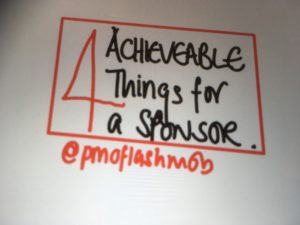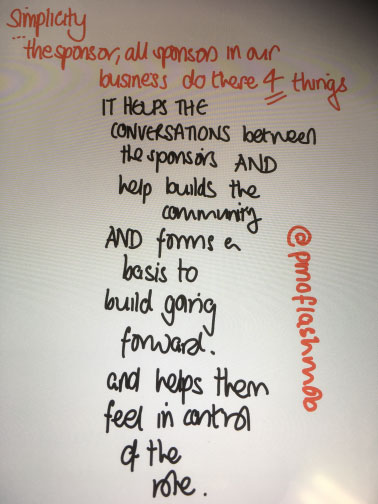You can find all our articles and past events
Free Articles | Inside PMO | PMO Conference | PMO Book Shelf
The Role of the PMO with Sponsors
If you’re working in a PMO today you’ll definitely have them. Sponsors.
Sponsors of projects and programmes and sponsors of the PMO itself.
These are the people who the buck stops with – the people who want and need the benefits that come from doing the project in the first place. Or in the case of PMO sponsorship, the benefits of having a PMO.
We’ve all got mixed experiences when working with them. PMI says it well in their Executive Engagement paper (PDF)
Too often, the term “project sponsor” conjures up the image of a disconnected executive whose main responsibility is to secure the project funds and then come in for the victory lap when it is all over. But an engaged executive sponsor — with a vested business interest in the project from kickoff to close — can mean the difference between success and failure.
1. Sponsorship Involvement Corresponds with Capability Levels
What does this mean? Great sponsorship comes with great project management. The better your organisation’s approach to project management, the better the involvement from sponsors.
If the maturity of project management delivery is lacking, chances are there will be work to be done with the sponsors.
 2. Sponsors Main Responsibility
2. Sponsors Main Responsibility
There has to be recognition that the sponsors is responsible for delivering the benefits of the project.
The project gives benefits – the whole reason for doing the project in the first place. It’s not just the outcome of the project but the actual benefits.
Benefits are often not realised for a while after a project concludes so someone has to be there to make sure the benefits do get realised.
This is not the Project Manager, this is the responsibility of the sponsor.
3. Sponsors Learn to Ask the Right Question
And prehaps the only question that counts when a project is nearing its conclusion.
“What am I going to do when the Project Manager has finished delivering this project?”
4. Two Things Needed by the PMO
The PMO has to ensure that there is an established project delivery process in place. That goes back to the correlation between maturity of delivery and the role of the sponsorship mentioned above. It’s up to the PMO – it’s their first main job to do in being able to be in a position of helping sponsors do better at their jobs.
The second thing is – the PMO has to establish credibility with senior management. Without credibility, no one is going to be interested in how the PMO can help.
5. What PMOs Need to Do
There’s three things:
- Know your stuff – that’s everything related to projects, programmes etc
- Know your business – that’s the organisation you’re working in
- Build relationships – across, up and down the business.
You’ll need these three things in order to help sponsors do their job.
6. Recognise the Behavioural Stuff
When working with sponsors – senior executives in an organisation – they don’t take kindly to someone pointing out that perhaps they’re not doing the best they can as a sponsor.
Who really wants to be made to feel incompetent? Especially in front of their peers etc
Yet many sponsors don’t really know what the role of the sponsor is.
That’s why it’s advised when you’re thinking about putting together some sponsorship training for your sponsors that you don’t call it training.
Call it an executive briefing instead. In fact, sponsorship training should ideally be delivered as ‘leadership’ training.
7. The Starting Point for Sponsors
 It helps to introduce a basic set of tasks required by each and every sponsor. There are four key areas, these are being accountable for, and signing off on:
It helps to introduce a basic set of tasks required by each and every sponsor. There are four key areas, these are being accountable for, and signing off on:
- the business case for the project
- the scope of the project
- the handover of the project
- and the benefits of the project
These are all small tangible things that the sponsors should take accountability for today.
We know that there is a lot more to the job – a lot of intangibles like stakeholder management – and you can work towards those once the four basics are in place
8. Sponsors and Project Managers
They need to work out the relationship they want with each other by working out what each actually wants from each other.
Interestingly in some cases as the sponsor becomes more experienced, the Project Manager can get more annoyed by this empowerment.
Well they do say that project management is all about people so we can expect different behavioural outcomes!
 9. A Sponsors Community
9. A Sponsors Community
Building a community for sponsors can work – it’s a place to share successes, discuss challenges and improve on the processes.
This is about sponsors getting together with other sponsors and talking about the sponsorship aspect of their roles with others. The best place to do this is at an existing board meeting or similar where all sponsors are together (portfolio meeting?)
10. Measurement Has a Place
At the moment many sponsors don’t have feedback, reward or recognition for doing the sponsor role.
HR changes will be needed – embedding the role within job descriptions is a start. Encouragement of specific performance targets too – which of course may only be achievable by certain types of PMO which have influence on HR matters.
To sum it up then, the PMO in its main objective of supporting and improving the programme/project delivery capability of the organisation – should include sponsor support in that remit.
If the PMO should start anywhere it’s making sure the four basic accountabilities (the starting point for sponsors) are in place; executive briefings have taken place to give a broader background on the role; and enabling a community of sponsors to exist by providing a framework that aids the conversations.
Thanks to West Yorkshire Fire and Rescue for hosting the event and to Eileen Roden for delivering the session.


